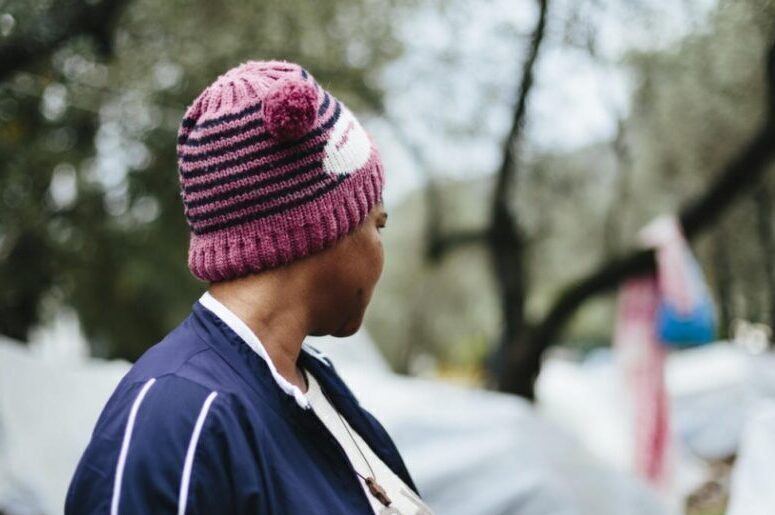The Diotima Centre, a recognized and specialized body on gender-based violence, is deeply concerned about the situation faced by survivors of gender-based violence in Moria since the beginning of the year, especially in the midst of a pandemic.
According to data from the Agency’s Gender-Based Violence Incident Management Service, which operates in Lesvos with the support of UNHCR in Greece, survivors, although in need of special care, remain trapped on the islands and have extremely limited protection.
Over-crowding and geographical confinement
These are women who have suffered multiple forms of gender-based violence in their country of origin, on the journey, and in the host country. Many of them have been subjected to torture, face serious health problems, and are often single mothers.
And despite the fact that they are often identified as vulnerable, they have little to no possibility to relocate inland, as they are also subject to geographical restriction under the new International Protection Act (1/1/2020).
They are thus forced to live in an absolutely precarious environment that further endangers their physical and mental health: As an indication only, the two wings designated for the sheltered housing of single women and single-parent families within the RIC are overcrowded (about 400 women and children), with the result that many survivors live fully exposed to multiple risks and gender-based violence, especially those in the informal Olive Grove camp outside the RIC.
Domestic violence within Moria
The Diotima Centre provides daily psychosocial support and legal assistance to dozens of cases of women who have suffered domestic violence within Moria, and the immediate removal of themselves and their children from the abusive husband/father is an absolute priority for their safety.
For these “emergencies”, safe housing options are hard to come by: Availability in the sheltered wings of the RIC is only occasional, despite the steady efforts of the few staff.
The possibility of accommodation in the Hostel for Abused Women of Lesvos has been discontinued. Referrals of survivors – asylum seekers are rejected, on the unofficial grounds that they cannot be accommodated, as their accommodation will not be short-term due to geographical constraints. We note that the decision to admit women to the Shelter is made by the Municipality’s Project Committee.
Moreover, the apartments of the ESTIA and PICPA, accept these cases only exceptionally, since normally domestic violence cases are excluded, as these apartments are not suitable, due to the absence of security guards.
The response system is also on the edge due to the coronavirus
The unprotected status is further entrenched by the pandemic and the restriction of movement, a situation in which domestic/sexual violence is on the rise.
We will not dwell here on the overcrowding and the total lack of sanitation infrastructure, which poses an immediate risk to public health inside and outside Moria, but rather on the limited capacities of the response and protection system under the emergency condition: courts are run on a dime, while applications for injunctions/restrictions for very serious cases are not dealt with under the urgency procedure.
Hospital escorts have been limited. The Lesvos Counselling Centre and organizations only serve by telephone. The Asylum Service has suspended its operation.
Reports of incidents to the police authorities, with whom there is largely effective cooperation, are now made by appointment only, and recently, for ‘preventive reasons’, survivors are not allowed to be accompanied by their lawyer.
Finally, the restriction on travel to and from Moria makes it difficult to go to the police station. As an example, we cite a case of a beneficiary whose passage was blocked for an hour by a police roadblock because her going to the PS to report an incident of domestic violence was not considered a sufficient reason for travel. Eventually, the transit was allowed, exceptionally.
No guarantees for the examination of applications for international protection
To all the above, serious reservations should be added about the respect of basic procedural safeguards in the examination of applications for international protection of survivors, based on the changes that the new law has brought to the procedure.
In particular, we have observed: incomplete information about their rights upon arrival; very short determination of first-level interviews which often leads to loss of legal representation; delivery of first-level rejection decisions to the Commander of the RIC, without a prior attempt to find the survivors, resulting in late appeals; lack of free legal assistance at second level, etc.
Finally, it is worth mentioning the inability of incoming women from 1/3/2020 to submit an asylum claim, due to the Legislative Act and the suspension of the registration of asylum claims, in violation of our country’s international obligations. This has resulted in extremely vulnerable women being arrested and remaining detained.
In light of this, we call on the Ministry of Migration & Asylum to proceed with the immediate decongestion of the islands, with priority given to the transfer of vulnerable groups, including survivors of gender-based violence and other vulnerable asylum seekers, to the mainland. We call on all relevant actors to strengthen the response system to gender-based violence in the refugee population, as well as in the local population, and to guarantee its smooth functioning.
Diotima Centre
31/3/2020





